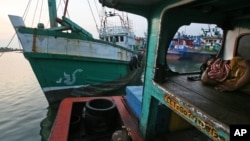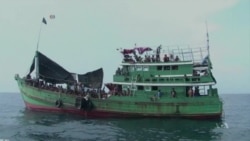Another stranded boat packed with hundreds of migrants believed to be victims of human trafficking has been spotted off the coast of Thailand.
The International Organization for Migration confirmed to VOA on Thursday that the vessel had been located, although it was not clear whether the boat was in Thai or Malaysian waters.
In an interview with VOA, Thai Lieutenant Colonel Bunjerd Manvej said the vessel was eight nautical miles from Malaysia's Langkawi island, putting it inside Malaysian territory. Malaysian officials denied this, insisting the boat was in Thai territory.
Chris Lewa with the Arakan Project, which has been monitoring the refugee crisis, told VOA the estimated 350 refugees were "absolutely" in Thai waters, just southeast of the island of Koh Lipe.
"They'll be really safe only when they're taken ashore," said Lewa, who added that the boat was one of two that received emergency assistance from, and then was pushed away by, the Malaysian navy earlier this week.
Jeffrey Labovitz, country director for the International Organization for Migration, said, “The Thais were ready on an emergency humanitarian basis to answer the distress call. They would have facilitated disembarkation, but apparently the Rohingya didn’t want to get off.”
Sources told VOA that brokers or smugglers were still on board the vessel and pressured the migrants not to accept the Thai offer of help.
A source said, “They want to go to Malaysia and didn’t want to complicate things by getting stuck in Thailand.”
Myanmar open to talks
Myanmar says the migrant crisis in Southeast Asia should only be discussed in reference to "boat people" and not "Rohingya."
Speaking to the VOA Burmese Service Thursday, Deputy Foreign Minister Thant Kyaw said the matter is a sensitive one for his country.
"For us, it will not be helpful to discuss if it is [on the issue of] Rohingya. As both our government and the public do not accept that, it will not be helpful at all if we discuss that," he said.
He added that his country stands ready to help anyone who can prove he/she is a citizen of Myanmar.
However, most who call themselves Rohingya do not have Myanmar citizenship despite claims that their families have lived in the country for generations. The impoverished minority group lacks the documentation to prove it.
The Myanmar official made the comments following a call by Thailand for a regional meeting in Bangkok to discuss the problem.
Concern from UN chief
The United Nations said in a statement Thursday that Secretary-General Ban Ki-moon "is concerned about the crisis evolving in the Andaman Sea and Strait of Malacca, where several thousand people are believed to be stranded on smugglers’ boats.”
The statement added that the U.N. chief was urging governments “to facilitate timely disembarkation” and calling on “all leaders of Southeast Asia” to intensify efforts to address the “human rights violations."
Southeast Asian governments have refused to take in the desperate refugees and migrants, many of whom were abandoned after a Thai crackdown on a vast people-smuggling ring disrupted the criminal transportation networks.
About 2,000 of the so-called boat people have been either rescued or intercepted and turned away in the past week. Activists estimated that as many as 8,000 people remained adrift in dozens of overcrowded boats.
Malaysia, Indonesia, and Thailand — three countries the migrants and refugees have tried to reach — have said the migrants are not their responsibility and have rejected appeals from the United Nations and rights groups.
Malaysian Deputy Home Minister Wan Junaidi said Thursday that his country must "send the right message: that they are not welcome here." Other Malaysian officials said sea and air patrols were being ramped up to prevent "illegal intrusion."
Camps hold 1,000 in Malaysia
Earlier this week, more than 1,000 abandoned boat people swam ashore in Malaysia. Officials said they were being held in detention camps while preparations were being made to send them elsewhere.
Nearly 600 migrants were rescued Sunday by the Indonesian navy. Officials said they were being given food and shelter in the north Aceh region while the government consulted with the United Nations and other international bodies.
Watch video report from VOA's Zlatica Hoke:
The U.N. refugee agency this week appealed for an international search-and-rescue operation to help the boat people. Many survivors have said those stuck at sea are hungry and sick, and some have died.
The United States is also "concerned by reports of thousands of migrants on land and at sea who may need urgent humanitarian protection and assistance," according to W. Patrick Murphy of the U.S. Embassy in Thailand.
Speaking via Twitter, Murphy said the U.S. was "appreciative" that regional governments had accommodated many of the Rohingya. But he stressed the "irregular migration" was a regional challenge "that needs to be addressed in the region."
Matthew Smith, executive director of the Fortify Rights group, told VOA he was concerned about the fate of those on board the boats. "The whole situation is appalling, start to finish," he said. "And it's an important point, I think, that it's been going on for quite some time. This certainly isn't the first time that boats have been pushed back to sea. This type of thing has been happening for several years. And the persecution of the Rohingya has been going on for several decades."
Migrant vessel
In an interview with VOA, Thai Lt. Col. Bunjerd Manvej said the vessel is eight nautical miles from Malaysia's Langkawi island, putting it inside Malaysian territory. Malaysian officials deny this, insisting the boat is in Thai territory.
Chris Lewa with the Arakan Project, which has been closely monitoring the refugee crisis, told VOA the estimated 350 refugees are "absolutely" in Thai waters, just southeast of the island of Koh Lipe.
"They'll be really safe only when they're taken ashore," said Lewa, who added the boat is one of two that received emergency assistance from, and then was pushed away by, the Malaysian Navy earlier this week.
IOM Country Director Jeffrey Labovitz said, “The Thais were ready on an emergency humanitarian basis to answer the distress call. They would have facilitated disembarkation, but apparently the Rohingya didn’t want to get off.”
Sources tell VOA that brokers or smugglers are still on board the vessel and pressured the migrants not to accept the Thai offer of help.
A source said, “They want to go to Malaysia and didn’t want to complicate things by getting stuck in Thailand.”
Earlier this month, more than 2,000 Rohingya and Bangladeshi migrants were rescued at sea following a Thai crackdown on human trafficking.
Sectarian unrest killed up to 280 people and displaced 140,000 others in June 2012. Since then, tens of thousands of Rohingya have been forced to stay in overcrowded camps in western Rakhine state.
Rohingya Muslims
Many of the refugees are Rohingya Muslims from Myanmar, where they are the victims of persecution that Human Rights Watch says amounts to ethnic cleansing and crimes against humanity. Rohingya people in Myanmar are largely denied basic rights such as citizenship and freedom of movement.
Others on board the boats were thought to be migrants from Bangladesh, including Rohingya, who were trying to escape poverty.
The boat people are victims of a large-scale human-trafficking scheme under which the migrants were promised jobs in neighboring countries but were later held for ransom or sold, essentially as slaves.
After years of pressure by international rights groups, Thailand recently moved to crack down on the multimillion-dollar people-smuggling operation. In the process, it found several abandoned jungle camps, including some that contained mass graves with dozens of bodies. Officials have arrested more than a dozen alleged smugglers, including some senior local officials.
This report was produced in collaboration with the VOA Burmese service.
VOA's Steve Herman and Thengi Htike contributed to this report.






